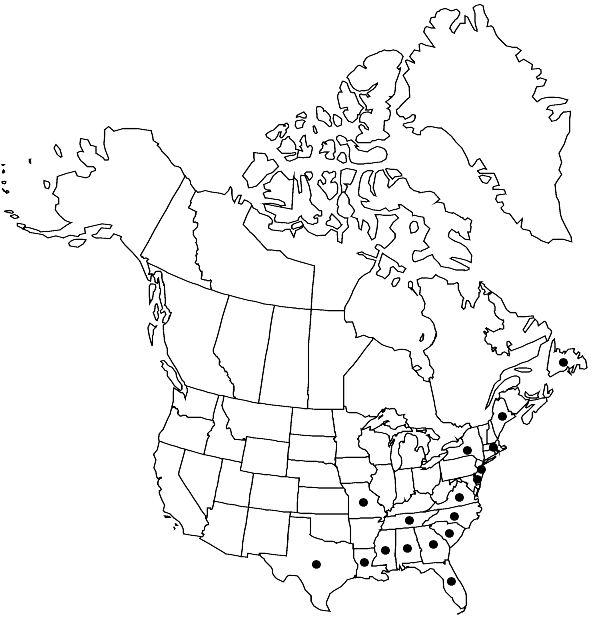Sphagnum carolinianum
Bryologist 86: 257, figs. 1983,.
Plants moderate to large, erect to floating, green to dark brown; capitulum large, well defined and flat-topped. Stems typically light green but grading to dark brown; superficial cortex of 2–3 layers of enlarged, thin-walled cells. Stem leaves lingulate to lingulate-triangular, 0.7–1.5 mm (to 3 mm in isophyllous forms), apex erose; hyaline cells mostly 1–septate but in a few cells with 2–3 parallel septations, efibrillose to fibrillose throughout, pores present in hemiisophyllous and isophyllous forms. Branches straight to somewhat curved, with spreading leaves. Branch fascicles with 2 spreading and 2 pendent in emergent forms, these reduced in aquatic forms to 2 per fascicle. Branch leaves variable, broadly ovate to ovate-lanceolate, 1.3–5 mm; straight, hyaline cells on the convex surface with 4–8 µm round to elliptic pores in nearly continuous rows along the commissures, the concave surface aporose or with some porosity as on the convex surface. Sexual condition unknown. Capsule not seen. Spores not seen.
Habitat: Forming wet often floating carpets in pools in weakly minerotrophic mires
Elevation: low to moderate elevations
Distribution

Nfld. and Labr. (Nfld.), Ala., Del., Fla., Ga., La., Maine, Mass., Miss., Mo., N.J., N.Y., N.C., S.C., Tenn., Tex., Va.
Discussion
The sporophytes of Sphagnum carolinianum are unknown. In its apparent restriction to the coastal plain, this species is most similar distributionally to such species as S. macrophyllum, S. fitzgeraldii, and S. tenerum. When forming carpets, S. carolinianum macrospically most resembles S. atlanticum but its branch leaves are not as elongate as those of the latter and its stem leaves have a much more obtuse apex. When growing aquatically, S. caroliniaum can resemble S. cribrosum, but in the latter species the hanging branches are not different from the spreading branches and may even be lacking.
Selected References
None.